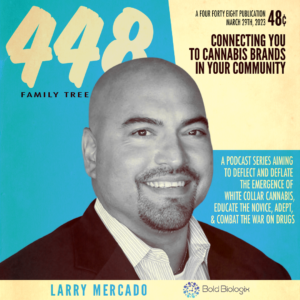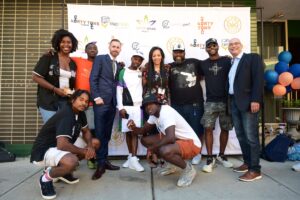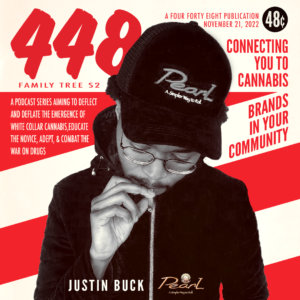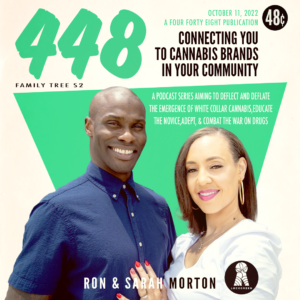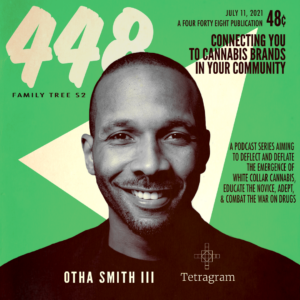Family Tree S2: Hope Wiseman (Mary & Main)
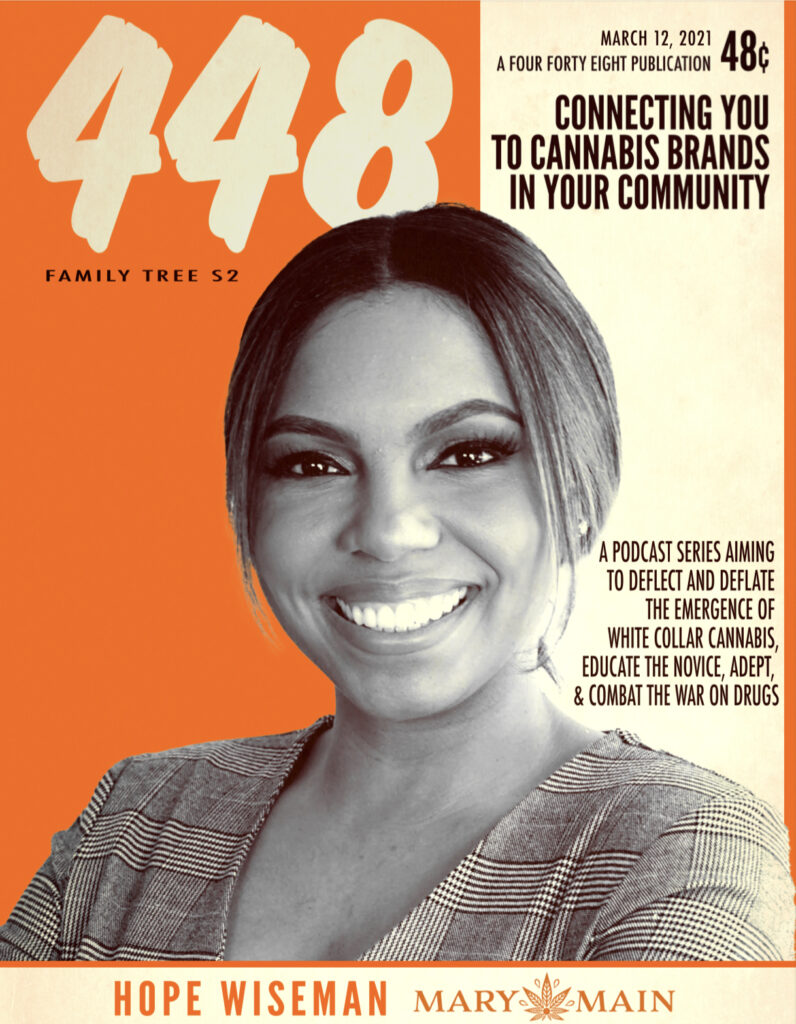

448: We feel like we brought in a heavy hitter in with this one. If you don’t know Hope Wiseman, right now, when this thing really jumps and pops off, you’re gonna know Hope Wiseman.
So we just want to give you your flowers and just say, we commend you for everything you’re doing in this space right now. And just want to give you the floor and just talk about what you being a young, thriving, black woman in this space means for everybody that’s coming after us.
Hope: Yeah. So as you know they’re not a lot of women in this space. There’s not a lot of women in high level positions, period. Whenever there is one, they’re highly celebrated. They’re very much so recognized and it’s because there’s just not a lot of us. So in this new emerging industry where people believe, and have compared the green rush to the gold rush, right.
I believe that this industry is going to create millionaires and billionaires even. We’ve seen a few billionaires already come out of this space. So I think that everyone looks at the cannabis industry as a new opportunity for women to thrive. Then on top of it, this industry is so rooted in social justice and social equity and all of those things breed inclusion.
When we talk about that, that gives a new opportunity for women to really make a name for themselves. So when this industry was first really getting hot on the legal side, everyone talked about how there were a lot of women founders and it was really almost like a phenomenon.
In the cannabis industry, women can succeed. As a lot of VC funding got into the industry you saw a lot of traditional investors getting into the industry and that number started to plummet. And it’s because people like to invest in people that they can see themselves in and most VC investors are white men.
It’s hard for them to look at a 20 something year old black girl and see themselves. So this industry breeds a lot of opportunity, but then we still have the traditional issues that we face everywhere that we have to go into. I think that’s exciting for women in this space, but we still have our hurdles to jump.
448: Yeah, definitely. Definitely. Just in society in general. I don’t think a lot of emphasis is placed on, or respect is given to women. So it’s high time for everybody to put some respect on women. I don’t understand, women do so much, they juggle a family, kids, work, relationships.
There’s so many things that y’all do. And men, quite frankly, we’re dumb as hell sometimes.
Hope: Sometimes (jokingly)
448: You guys counterbalance that.
Hope: I think, that’s in every industry. I think that women, we’re so strong and resilient and multi-faceted and all those things, like you said, we can do so many things at once. And I think in this industry it’s no different. I think the biggest difference in this industry is that it’s kind of nuanced because it’s a very sophisticated industry.
It takes a lot of knowithall to be able to run a cannabis business because they’re highly regulated. They are just very complicated structures. It’s not your typical business and you can’t do business your typical way. But then at the same time, it’s kind of like this… It has a really interesting culture to it.
It’s not typical, you might go into a business meeting and today you might be with suits and tomorrow you might be with people smoking in their office, you know, like you gotta be able to switch. I think that’s what’s really cool about this industry.
MJBiz Daily: Do you ever feel isolated as a woman (within the cannabis industry)?
Hope: I think the cool thing about this industry is, you know the women in this space, we all band together. I never feel isolated, because there’s so many of us doing really great things. We all know each other. I think that’s exciting about the industry being so small right now, we all are connected. Between the women in the space and then the black community in the space.
You know, I feel very supported.
448: Mary & Main just had an interview as well recently. I believe, with some of the board members of Supernova Women? How did you feel about that interview?
Hope: Yeah, so I am a board member of Supernova Women, which is a nonprofit organization that focuses on helping women of color succeed in this industry and actually operate businesses.
So everybody on the board we’re all actual operators in this space. And I thought it was really cool that I was able to bring some of my fellow board members on a platform that I could host. To let my audience that may not know about my work with supernova, what we do. One of our biggest claims to fame is our advocacy work.
We do a lot of work all around the country to build social equity inclusion into legislation that is coming out around legalization. So, Amber Senter, our Co-Founder and Executive Director right now, She’s done a lot of work in the city of Oakland. And a lot of people may not know this, but the city of Oakland was the first municipality to have social equity inclusion.
That kind of sparked the flame that has now gone all across the nation. And it has been picked up at the state level even. So I’m really proud to be a part of Supernova Women and all of the history that we’re making. I’m bringing the same efforts to Maryland as Maryland is discussing legalization.
We have states right across the street from us, Virginia, has just legalized and they’re in the process of developing their regulations that are going to govern their program. Even DC. So many businesses are doing really amazing things right now. So I’m really happy to be able to take some of the strategies that we’ve implemented through Supernova on the west coast, to the east coast.
448: That’s dope. That’s extremely dope. Thank you for that too.
Hope: Yeah. Yeah.
448: You’re definitely forging the way for a lot of women. So I guess we’ll wrap up on the live and ask you 1 last question. For women out there that are wanting to get into the industry or women that are already in the industry just getting their feet wet, what are some key resources that you would recommend, suggestions or advice you would give to women just entering the industry or want to be in the industry?
Hope: There are a lot of affinity groups that are focused on helping you succeed. So don’t feel alone. There are pockets of people that really, really are gonna pour into you.
Groups like Supernova Women, Women Grow with their new leadership led by Gia Moron. She’s awesome. These are women who have succeeded themselves that want to help other women have a place in this space also.
Also, I encourage people to look at their current skillsets and figure out how they can transfer their current skillsets into this industry instead of trying to reinvent the wheel.
Also you don’t have to be a dispensary owner. There’s so many ways that you can be a part of this industry and make an impact and make money. So I definitely encourage people to kind of take inventory of their current skillsets and figure out how they can make their own place in this space.
It’s a full industry with a lot of different sectors and a lot of different opportunities that are not yet saturated. That’s the cool thing about this industry? I really don’t think there’s a part of the industry that is yet saturated. Even when they say in markets like California or Oklahoma, which is an open market for those of you that want to just play the free market game.
There’s so much opportunity by doing that. But I think that most of the women that I’ve seen be really successful in this space and that make an impact. You see them on panels, you look to them as thought leaders. They’re the people that have transferred their current skillsets into this space.
If you were a publicist before? Now become a cannabis publicist. If you did project management before, do project management now and maybe work on applications. You know, all these different things, you definitely add value. A lot of businesses are prioritizing diversity. And that definitely comes with gender diversity within an organization, too.
We know that organizations that are more diverse, normally have more top line revenue. And if you can make that case, especially when you’re interviewing, kind of look up the senior management, look up their org chart. And say, “You know, you guys really need more diversity and I’m going to bring to you multiple different demographics”.

